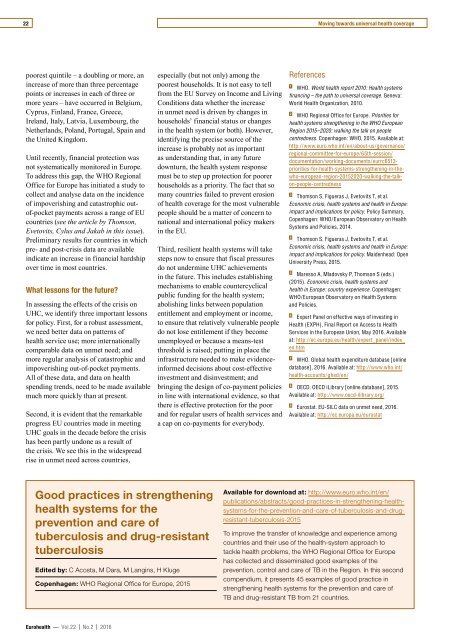EUROHEALTH
Eurohealth-volume22-number2-2016
Eurohealth-volume22-number2-2016
You also want an ePaper? Increase the reach of your titles
YUMPU automatically turns print PDFs into web optimized ePapers that Google loves.
22<br />
Moving towards universal health coverage<br />
poorest quintile – a doubling or more, an<br />
increase of more than three percentage<br />
points or increases in each of three or<br />
more years – have occurred in Belgium,<br />
Cyprus, Finland, France, Greece,<br />
Ireland, Italy, Latvia, Luxembourg, the<br />
Netherlands, Poland, Portugal, Spain and<br />
the United Kingdom.<br />
Until recently, financial protection was<br />
not systematically monitored in Europe.<br />
To address this gap, the WHO Regional<br />
Office for Europe has initiated a study to<br />
collect and analyse data on the incidence<br />
of impoverishing and catastrophic outof-pocket<br />
payments across a range of EU<br />
countries (see the article by Thomson,<br />
Evetovits, Cylus and Jakab in this issue).<br />
Preliminary results for countries in which<br />
pre- and post-crisis data are available<br />
indicate an increase in financial hardship<br />
over time in most countries.<br />
What lessons for the future?<br />
In assessing the effects of the crisis on<br />
UHC, we identify three important lessons<br />
for policy. First, for a robust assessment,<br />
we need better data on patterns of<br />
health service use; more internationally<br />
comparable data on unmet need; and<br />
more regular analysis of catastrophic and<br />
impoverishing out-of-pocket payments.<br />
All of these data, and data on health<br />
spending trends, need to be made available<br />
much more quickly than at present.<br />
Second, it is evident that the remarkable<br />
progress EU countries made in meeting<br />
UHC goals in the decade before the crisis<br />
has been partly undone as a result of<br />
the crisis. We see this in the widespread<br />
rise in unmet need across countries,<br />
especially (but not only) among the<br />
poorest households. It is not easy to tell<br />
from the EU Survey on Income and Living<br />
Conditions data whether the increase<br />
in unmet need is driven by changes in<br />
households’ financial status or changes<br />
in the health system (or both). However,<br />
identifying the precise source of the<br />
increase is probably not as important<br />
as understanding that, in any future<br />
downturn, the health system response<br />
must be to step up protection for poorer<br />
households as a priority. The fact that so<br />
many countries failed to prevent erosion<br />
of health coverage for the most vulnerable<br />
people should be a matter of concern to<br />
national and international policy makers<br />
in the EU.<br />
Third, resilient health systems will take<br />
steps now to ensure that fiscal pressures<br />
do not undermine UHC achievements<br />
in the future. This includes establishing<br />
mechanisms to enable countercyclical<br />
public funding for the health system;<br />
abolishing links between population<br />
entitlement and employment or income,<br />
to ensure that relatively vulnerable people<br />
do not lose entitlement if they become<br />
unemployed or because a means-test<br />
threshold is raised; putting in place the<br />
infrastructure needed to make evidenceinformed<br />
decisions about cost-effective<br />
investment and disinvestment; and<br />
bringing the design of co-payment policies<br />
in line with international evidence, so that<br />
there is effective protection for the poor<br />
and for regular users of health services and<br />
a cap on co-payments for everybody.<br />
References<br />
1<br />
WHO. World health report 2010: Health systems<br />
financing – the path to universal coverage. Geneva:<br />
World Health Organization, 2010.<br />
2<br />
WHO Regional Office for Europe. Priorities for<br />
health systems strengthening in the WHO European<br />
Region 2015–2020: walking the talk on people<br />
centredness. Copenhagen: WHO, 2015. Available at:<br />
http://www.euro.who.int/en/about-us/governance/<br />
regional-committee-for-europe/65th-session/<br />
documentation/working-documents/eurrc6513-<br />
priorities-for-health-systems-strengthening-in-thewho-european-region-20152020-walking-the-talkon-people-centredness<br />
3<br />
Thomson S, Figueras J, Evetovits T, et al.<br />
Economic crisis, health systems and health in Europe:<br />
impact and implications for policy. Policy Summary,<br />
Copenhagen: WHO/European Observatory on Health<br />
Systems and Policies, 2014.<br />
4<br />
Thomson S, Figueras J, Evetovits T, et al.<br />
Economic crisis, health systems and health in Europe:<br />
impact and implications for policy. Maidenhead: Open<br />
University Press, 2015.<br />
5<br />
Maresso A, Mladovsky P, Thomson S (eds.)<br />
(2015). Economic crisis, health systems and<br />
health in Europe: country experience. Copenhagen:<br />
WHO/European Observatory on Health Systems<br />
and Policies.<br />
6<br />
Expert Panel on effective ways of investing in<br />
Health (EXPH), Final Report on Access to Health<br />
Services in the European Union, May 2016. Available<br />
at: http://ec.europa.eu/health/expert_panel/index_<br />
en.htm<br />
7<br />
WHO. Global health expenditure database [online<br />
database], 2016. Available at: http://www.who.int/<br />
health-accounts/ghed/en/<br />
8<br />
OECD. OECD iLibrary [online database], 2015.<br />
Available at: http://www.oecd-ilibrary.org/<br />
9<br />
Eurostat. EU-SILC data on unmet need, 2016.<br />
Available at: http://ec.europa.eu/eurostat<br />
Good practices in strengthening<br />
health systems for the<br />
prevention and care of<br />
tuberculosis and drug-resistant<br />
tuberculosis<br />
Edited by: C Acosta, M Dara, M Langins, H Kluge<br />
Copenhagen: WHO Regional Office for Europe, 2015<br />
Available for download at: http://www.euro.who.int/en/<br />
publications/abstracts/good-practices-in-strengthening-healthsystems-for-the-prevention-and-care-of-tuberculosis-and-drugresistant-tuberculosis-2015<br />
To improve the transfer of knowledge and experience among<br />
countries and their use of the health-system approach to<br />
tackle health problems, the WHO Regional Office for Europe<br />
has collected and disseminated good examples of the<br />
prevention, control and care of TB in the Region. In this second<br />
compendium, it presents 45 examples of good practice in<br />
strengthening health systems for the prevention and care of<br />
TB and drug-resistant TB from 21 countries.<br />
Eurohealth — Vol.22 | No.2 | 2016
















